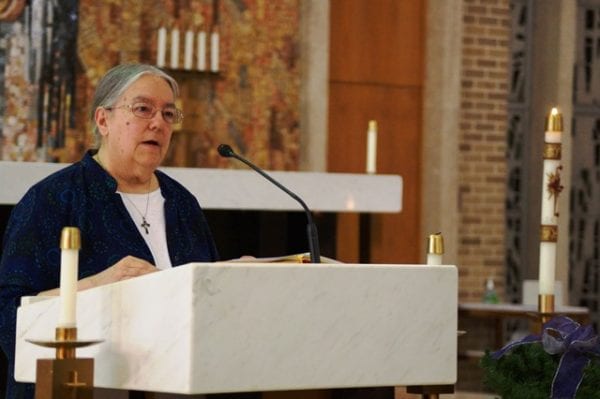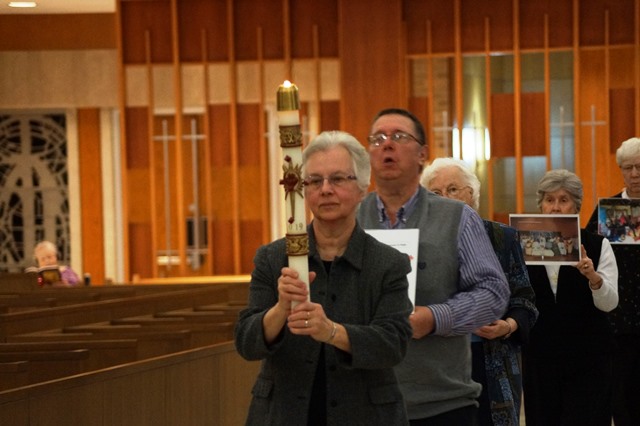Preaching at Evening Prayer, December 8, 2019
Isaiah 11:1-9 (Inclusive Hebrew Bible, abridged)
Then a shoot shall sprout from the stump of Jesse; from Jesse’s roots, a branch will blossom: the Spirit of the Most High will rest on you - a spirit of wisdom and understanding, a spirit of counsel and strength, a spirit of knowledge and reverence.
You will delight in obeying the Most High, and you won’t judge by appearances, or make decisions by hearsay. You will treat poor people with fairness and will uphold the rights of the land’s downtrodden. Justice will be the belt around your waist - faithfulness will gird you up.
Then the wolf will lie down with the lamb, and the leopard will lie down with the young goat, the calf and the lion will graze together, and a little child will lead them. The lion will eat hay like the ox. The toddler will dance over the viper’s nest.
There will be no harm, no destruction anywhere in my holy mountain; for as the water fills the sea, so the land will be filled, knowing the Most High.
We are all well familiar with this reading for Advent. Its powerful vision of solidarity, of living in right relationship and communion and peace, seeps like warmed oil into our traumatized and assaulted consciousness, soothing the hurt and grief that we witness daily, offering an alternative to a world that seems to be bent upon tearing itself apart.
Many of us have become numb from overexposure to the unending stories that weigh us down, cause us to shake our heads in disbelief, wring even more tears from hearts that can’t bear to hear more.
How often we pray for unity in our fractured world, for the understanding of our oneness with the whole because if we had such an understanding, how could we cause hurt anywhere since we would know it would be felt everywhere.
So we keep praying for unity, not realizing that our prayers have been answered. Every time we feel the world’s pain we personally experience our oneness with the whole. Every time we anguish with life’s struggle to flourish in all its phases, every time we reach out to ease the suffering of children, and women, and old people, and indigenous people, and dying species, and defiled rivers, and animals murdered for their body parts we are aware that we are all one.
If only we could then act upon that awareness with a spirit of wisdom and understanding, with an inherent incapability to judge others by appearance, by our fair and equitable treatment of all Earth’s lives.
If only the lion and calf could lie down together and the child could play with the cobra and neither would hurt the other. If only there would never be hurt on all God’s holy mountain.
If only universal peace actually meant no more struggle, no more pain. And yet, it doesn’t, it can’t. Not in this Universe.
Life in our evolutionary Universe will always mean struggle, and tension, and hurt, and each of us in our own ways consuming the other because the death of one is necessary for the birth of the other, the struggle of one inspires and strengthens the other, and newness, and wonder, and joy, and insight, and growth can only come from the chaos of breakdown. That is the promise and the hope our Creation Story gives us.
So what hope does Isaiah’s vision hold for us? How do we find hope in the cruelty we inflict upon one another? Who is our hope?
A shoot shall sprout from the stump of Jesse and a branch shall blossom. We have long ascribed that prophecy to Jesus, forgetting how hard Jesus worked to make us understand that each of us is that shoot from Jesse’s stump. Each one of us fulfills the prophecy.
 In the book Choosing Peace: The Catholic Church Returns to Nonviolence, Terrence Rhynne offers us the following insight: Jesus {like so many of us on this planet} was born in a land seething with violence. The people of his day thought they had only three alternatives to that violence: fight, flight, or accommodate. Jesus offered a fourth way: build an inclusive community, a community that includes so-called enemies, by using the power of nonviolent, loving, willing-to-risk-suffering action. Jesus offered this fourth alternative and then went to work to change the underlying causes of the suffering - the structural violence built into the political systems that keep people oppressed.
In the book Choosing Peace: The Catholic Church Returns to Nonviolence, Terrence Rhynne offers us the following insight: Jesus {like so many of us on this planet} was born in a land seething with violence. The people of his day thought they had only three alternatives to that violence: fight, flight, or accommodate. Jesus offered a fourth way: build an inclusive community, a community that includes so-called enemies, by using the power of nonviolent, loving, willing-to-risk-suffering action. Jesus offered this fourth alternative and then went to work to change the underlying causes of the suffering - the structural violence built into the political systems that keep people oppressed.
So, if we are to belt ourselves with justice, gird our loins with faithfulness, and uphold the rights of the downtrodden, then we must embrace this fourth alternative. Fight, flight, accommodation may at certain times have their place, but as a rule, they don’t work well at all and in the end resolve nothing.
We must build an inclusive community, one that includes the other, no matter how other is defined. The lion and calf, the leopard and goat, the child and viper can lie down together.
It is the work of each one of us, in whatever capacity we have to do so, to make that happen. And we do not do that work alone.
Rhynne goes on to say: Jesus’ message was not directed to individuals but to a community of disciples. That is why church is so important for living this message. Only seeing others live this way of nonviolence and resistance can individuals continue to live it. It calls for the continual unlearning of the ways of the world and continually modeling nonviolent action for one another. “Discipleship is not a heroic endeavor of individuals but rather a way of life of a community.” (Stanley Hauerwas)
And that brings us to the Dominican Month of Peace. It was conceived three years ago to promote a global Dominican solidarity with our sisters and brothers who are working to bring hope out of the chaos of violence and war.
It holds up for us our Dominican community of disciples, those who model for the rest of us the way of nonviolent resistance to cultural and political oppression. And we in turn provide them our support and solidarity for the work that they do in the name of all of us.
In 2017 the Dominican Month for Peace demonstrated solidarity with the suffering of the Colombian people and with the efforts of Dominicans there to be advocates of peace. In 2018, we focused on supporting efforts of our Dominican brothers and sisters struggling for credible elections in the Democratic Republic of Congo.
This year we focus on lndia. We Dominicans have a long history in that nation, having first arrived in 1291. Since then India has grown to a population of almost 1.4 billion people, and today there more than 800 Dominicans serving there.
All of us stand in solidarity with the work they do to counter the deprivation and abuse of enslaved children, of women, and of tribal peoples (India’s indigenous).
Our Springfield congregation joins Dominicans around the world who are disseminating materials for education, prayer, preaching, and action to inform ourselves and to respond to what we are learning.
There is much we can do. And we can certainly all pray. But our prayer should not be our asking God to show mercy and to protect and console the victims.
God does not show mercy. God is mercy itself. God does not console. God is consolation itself. We do not need to ask God to be what God already is.
It is our work to share mercy, our work to protect and console. It is our work to confront the political systems that enslave and degrade and abuse. It is our work to build that inclusive community that breaks down the fear that feeds the power of oppressors and keeps them in their own chains. It is our work.
We are the sprout from Jesse’s stump. Once we own that we can we look for Isaiah’s vision to become reality.


